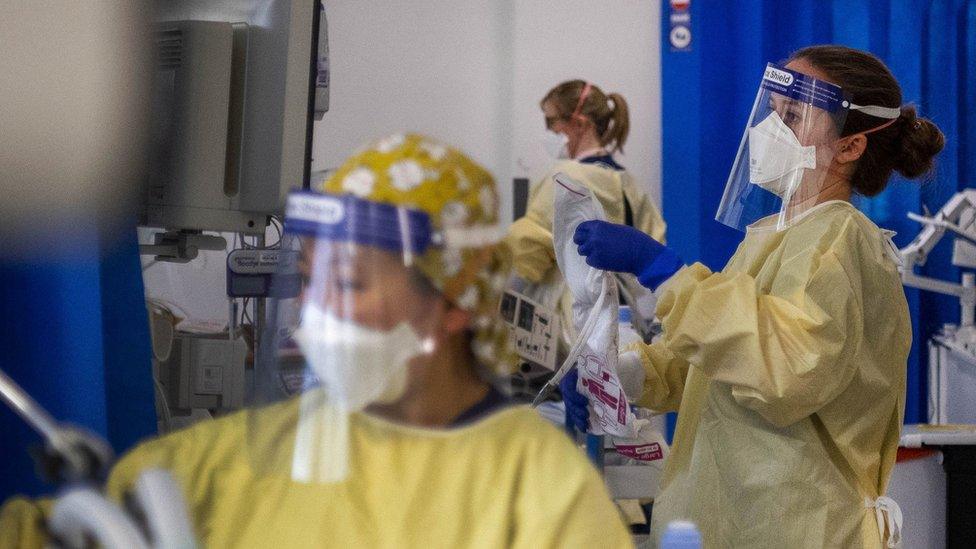Covid-19: NI ministers agree to relax self-isolation rules
- Published
- comments
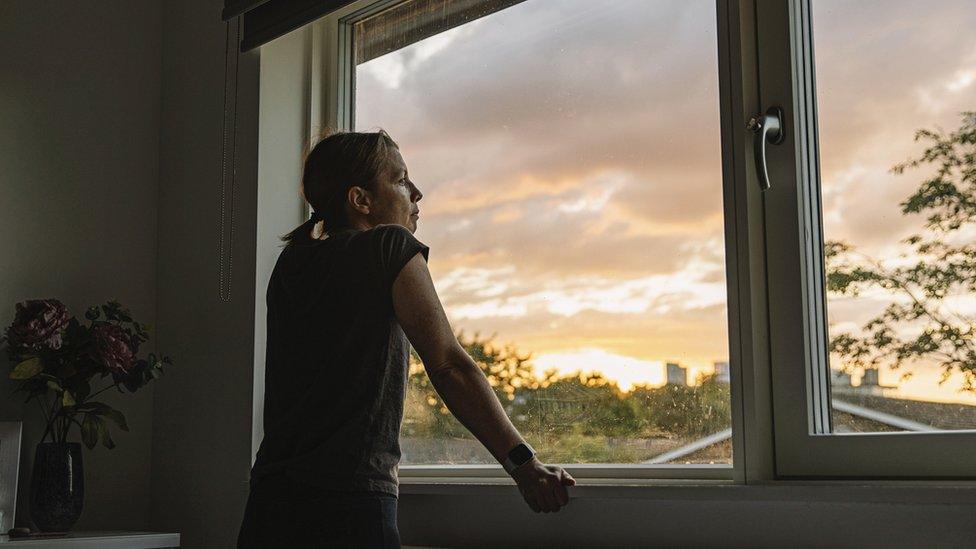
Currently anyone who is a close contact of a Covid-19 case in Northern Ireland must self-isolate for 10 days
The Stormont Executive has agreed to a number of changes to Covid-19 rules, including the end of close contacts self-isolating if they are fully vaccinated.
Other changes have been agreed for schools and the hospitality sector.
Class bubbles will no longer be required from the start of term.
The rule-of-six - the number of people allowed to sit at tables together in pubs and restaurants - has also been scrapped.
However, the executive stopped short of changing rules on social distancing or face coverings.
Post-primary students will also still have to wear masks in class.
First Minister Paul Givan said he hoped for a decision to lift all restrictions by the end of September and that the "justification for regulations is diminishing".
He also said he had hoped to see fewer restrictions for the hospitality sector in the latest changes and that it was time to move from a regulatory model to one of "personal responsibility".
However, Deputy First Minister Michelle O'Neill said the executive had taken a "cautious approach", which was "fully supported by public health advice".
What changes have the executive agreed on?
The executive agreed to the changes to Covid-19 rules following discussion of a paper submitted by Health Minister Robin Swann.
The major change, to take affect from Monday (16 August), will see people who are notified as close contacts not having to self-isolate if they have been fully vaccinated.
They will still be advised to take a PCR (Polymerase Chain Reaction) Covid test on day two and eight of the process.
If someone tests positive, they must continue to self-isolate, even if they do not have symptoms of the disease.
People who started self-isolating before 16 August can stop on that date but only if they have been fully vaccinated.
It will bring Northern Ireland into line with England, where the change is also taking effect on Monday.
The move has already taken effect in Scotland and Wales.
In schools, class bubbles will no longer be required from the start of term.
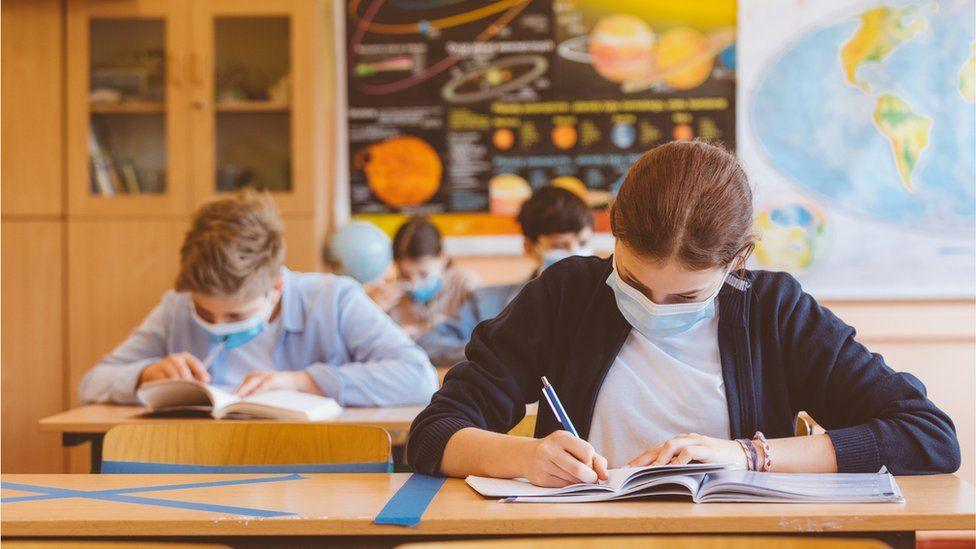
Most post-primary students wear masks in class
However, ministers have decided to retain face coverings for post-primary students in classrooms for the first six weeks of term.
Other moves agreed by the executive include:
The limit on numbers of people allowed to meet outdoors in private gardens will be removed
Further education and higher education and night classes will be able to return to full in-person learning
So-called support bubbles will no longer exist
The rule of six - the number of people allowed to sit at tables together in hospitality venues - will be scrapped (this will also apply to wedding celebrations and receptions)
The requirement to maintain social distancing at all times on public transport will be lifted, to allow more people on buses and trains
Conferences and exhibitions will be allowed to resume
Outdoor raves will now be allowed
Indoor premises and workplaces in Northern Ireland are still required to comply with a social distancing rule of at least 1m (3ft).
That rule has been lifted in other parts of the UK and many people in Northern Ireland's hospitality sector are keen to see it relaxed locally too.
Nightclubs also remain without a reopening date.
The executive will keep the measures under review.


The takeaway from today's executive meeting? The finishing line on restrictions is still not in sight.
The DUP is keen to move full steam ahead and scrap the rest of the rules before the end of next month, particularly as furlough and other support for hospitality businesses slip away.
But contrast its tone with other parties and health officials who are more hesitant, saying the vaccination rate and case numbers mean progress must be slower.
Those arguments within the executive over regulations versus guidance and personal responsibility will continue.
It feels, though, like it's soon going to have to come to a head.

What have the first and deputy first ministers said?
First Minister Paul Givan said he hoped the changes would go further for pubs and restaurants and indicated he hoped all restrictions could be lifted by the end of September.
Mr Givan, a Democratic Unionist Party assembly member, said the restrictions on social distancing and table service had affected the hospitality sector's sustainability.
"From my party's perspective, we're getting to the point that personal responsibility, taking informed decisions at an individual level, is how we need to address this.
"The justification for having regulations in place for this is diminishing and I don't think is proportionate."
"The justification for regulations is diminishing"
He said the executive would revisit remaining regulations during meetings due to take place on the 1 September and 9 September.
But he said there would be no "freedom day" rhetoric.
"England portrayed what they were doing as a freedom day. If we look at the restrictions that we had two months ago to where we are today, we are well on the way now to narrowing that difference.
"Phrasing it though as freedom day is not language I think we're going to use, because we still want people to take that personal responsibility."
Covid-19: 'We are taking a cautious approach' - O'Neill
Deputy First Minister Michelle O'Neill said Northern Ireland was at the peak of the current Covid wave, but that "we should expect to see cases starting to come down over the next week".
She said the executive had taken a "cautious approach", which was "fully supported by public health advice".
"I think what we're doing is proportionate to the current level of cases," she added.
"We'll have a better sense of where we are in the first week of September - that's when we revisit all the issues that have not been moved on today."
The Sinn Féin assembly member said vaccination was Northern Ireland's "best defence".
"We didn't reach the levels that we would have wanted, if you have compared us to England, Scotland and Wales, the south have now overtaken us.
"It's not about vaccine shaming, but anybody hasn't had the vaccine yet, we would encourage people to please take it up, it's the best thing we can do."
Health Minister Robin Swann said the changes "provides yet another example of the benefits of being fully vaccinated".
Education Minister Michelle McIlveen said the new rules should give schools more "flexibility" with pupils.
What has the reaction been like?
Dorothee Fassunge from Belfast restaurant L'Etoile du Nord said changes to self-isolation rules removed a risk that was "hanging over the business".
Speaking to BBC News NI's Evening Extra programme, she welcomed the end to the six person limit - although she said it would be awhile before she booked big groups.
"As a business owner it is, yes, about making money but it is personal responsibility for me too, for my staff and my customers, to ensure everybody is safe," she said.
Aaron McHenry, who manages The Elk in Toome, said the end of the rule-of-six was "great news" adding: "For any family event it's great everybody can come, sit together and eat together, which will help things along."
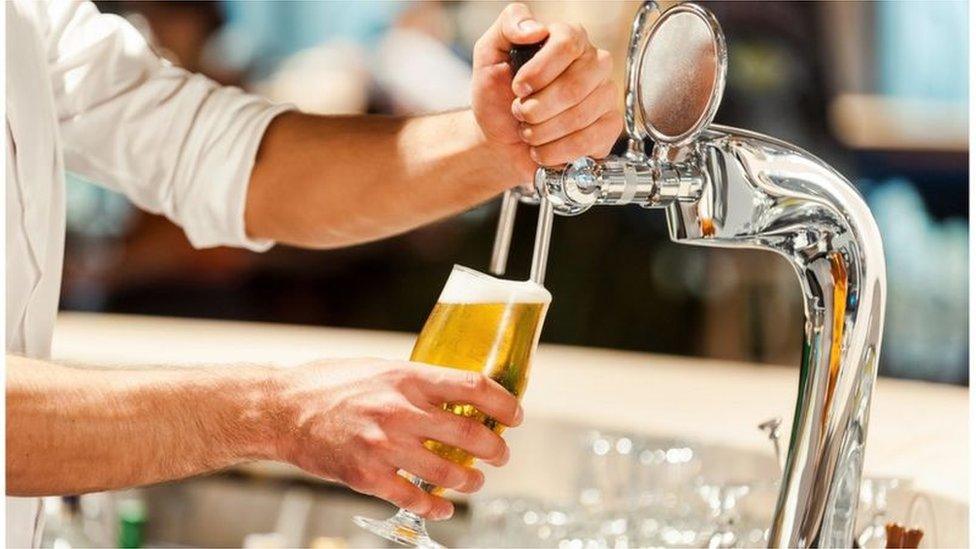
The hospitality sector in Northern Ireland is keen to see current social distancing rules relaxed
Industry bodies Hospitality Ulster and the Northern Ireland Hotels Federation (NIHF) both welcomed the relaxations but called on the executive to remove further restrictions, such as pubs being table service only as well as international travel restrictions.
Retail NI's chief executive Glyn Roberts welcomed the move, saying the end to self-isolation would help businesses managing staff shortages.
However, Angela McGowan, from the Confederation of British Industry (CBI) Northern Ireland, said Thursday's decision was a "missed opportunity" and that some would feel the changes "haven't gone far enough".
Meanwhile, those from the care home sector also said it was unclear whether self-isolation rules would be relaxed for care home staff.
Julie Ann McNally from Care Home Advice and Support NI said isolation had been "shocking and traumatic" for both care home residents and their families.
What brought about the rule changes?
The executive's decisions came after it discussed a paper submitted by Health Minister Robin Swann, in which he said there were good reasons why Northern Ireland should follow the same self-isolation rules as the other parts of the UK.
The health minster stated that "it is likely that the period of good weather in late July helped to suppress the virus transmission and this has now increased again as people have interacted indoors".

Robin Swann said there was a "significant benefit in maintaining alignment across the UK nations"
He added that positive cases remain highest in the "18-30 age band but are rising slowly in almost all age bands".
He also told his ministerial colleagues that the Delta variant accounts for over 90% of all cases.
The health minister stressed to his colleagues that "it is important to note that the position in Northern Ireland is significantly worse at present that the rest of the Common Travel Area (UK and the Republic of Ireland) in relation to case numbers, hospital pressures and vaccination status".
But his paper added that his discussions with the chief scientific advisor and the Northern Ireland modelling group "indicates the current wave of Covid 19 in Northern Ireland is either at peak or nearing its peak".
Related topics
- Published8 October 2021
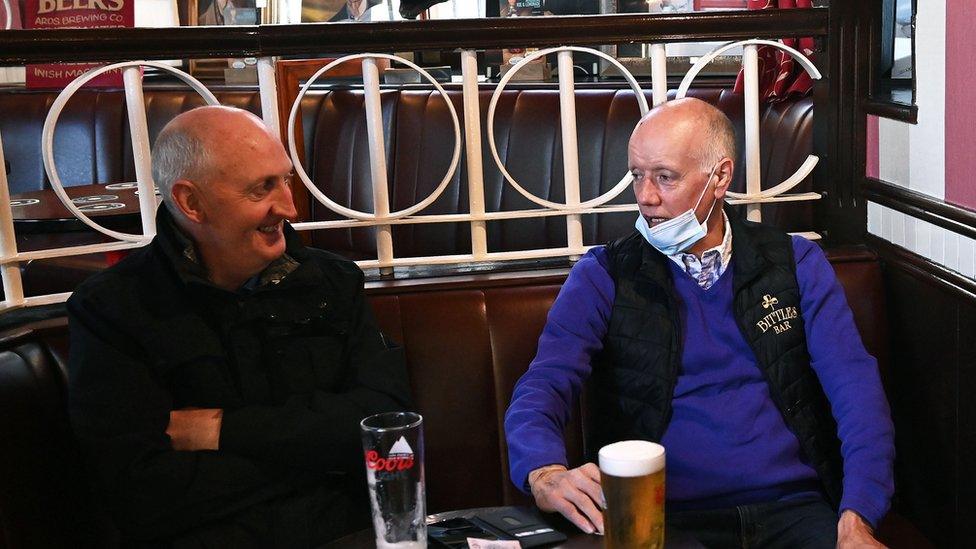
- Published11 August 2021
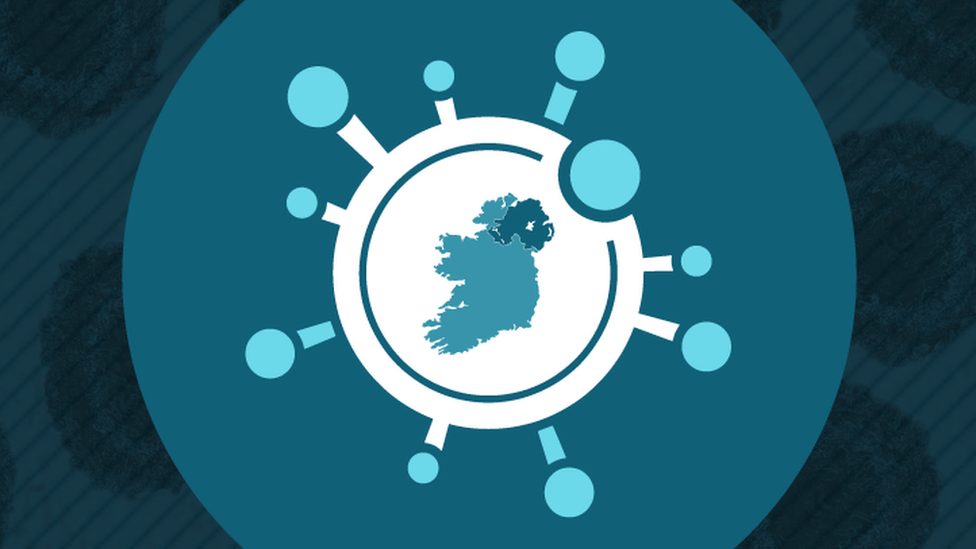
- Published7 August 2021
